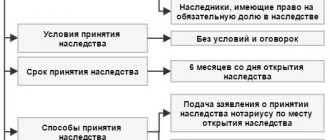Successors have the right to receive the inheritance after the death of the mother within six months . In this case, it is important to comply with the legally prescribed rules of priority or follow the instructions specified in the will, if present.
If the heirs renounce their right, another 3 months for the next heirs to make a decision.
This is the maximum period allowed under the law. Attention! Article 1112 of the Civil Code states that intangible benefits cannot be the subject of inheritance, as well as non-property rights that are inextricably linked to a specific person.
Features of inheritance by law
In the absence of a completed will, the legislation of the Russian Federation provides for a special procedure for entering into inheritance by law.
After the death of a citizen, the right to his property belongs to the heirs in order of priority (Article 1141 of the Civil Code of the Russian Federation). The first priority, which can claim part of the property after the death of a father or another family member, includes his children (adopted and natural), both parents and a spouse.
If there are no representatives of the first priority, then the right to inherit by law passes to the next priority (the process is repeated until the testator’s property is accepted).
The right to inherit in the absence of a will is assigned to 8 lines of successors:
- as written above, the first includes the parents, children and husband/wife of the testator (after the death of the spouse);
- the second includes the closest relatives of the testator’s grandfathers, sisters, grandmothers and brothers;
- when moving to the third - the aunts and uncles of the deceased citizen;
- the fourth calls on great-grandparents;
- all existing great-aunts (grandfathers) and grandchildren (granddaughters) belong to the fifth;
- cousins aunts and uncles, nieces and nephews, great-grandchildren - already by the sixth;
- the seventh includes people who are not in close family relationships with the citizen, i.e. the stepmother or stepfather of the testator, his stepsons and stepdaughters;
- persons who are dependent on the deceased citizen are classified as eighth priority, if the testator has no other relatives.
Also, do not forget about the possibility of obtaining inherited property by right of representation. In this case, inheritance by law passes to the descendants of the heir, who should have acquired the property of the testator, for example, after the death of the father. However, in order to enter into inheritance for the category of persons specified in Articles 1142–1144 of the Civil Code of the Russian Federation, it is necessary to comply with certain nuances, namely:
- You can exercise the right of grant only after death
- heir (for example, after the death of the successor’s mother, who is the testator’s aunt);
- descendants are able to claim that part of the property that should have gone to the deceased heir.
Since the times of Roman law, the death of ancestors was considered a reason for transferring property to children. Since that time, laws have changed and been refined, but one thing has remained unchanged - receiving the property of the deceased is the implementation of the legal rights of the heirs. However, the will of the deceased is considered the key point. The main law of the country - the Constitution of the Russian Federation - states that everyone has the right to dispose of property according to their own will.
In continuation of the above, it is necessary to add that there are several methods to receive an inheritance:
- In law. Relatives become successors in order of priority.
- According to the will. Heirs are persons appointed personally by the testator.
- Actually. The rights of inheritance are vested in the cohabitants of the deceased.
But children, until they have reached their 18th birthday, are obligatory heirs who are entitled to a share in any case.
In addition to the state fee for filing an application with a notary, the heir may incur the cost of a fee when obtaining a certificate if, for example, he accepts real estate. Each additional specialist service is paid separately. An initial consultation with a lawyer regarding inheritance law is free. Personal participation in the process will cost money according to the tariffs indicated in the price list. Also keep in mind that the inheritance may entail debts, and the law obliges the successors to repay them.
State duty amount
Standard notary services are determined according to the tariffs from the price list. Registration of real estate according to the law will cost an amount depending on the value of the property being accepted. If a son, daughter, spouse, mother or father inherits, the duty will be 0.3%. Everyone else pays twice as much. But, if we are talking about an inheritance accepted after the death of parents, then 0.3% of the price of an apartment or house is all that will have to be transferred.
There may be several payments in order. You will have to spend money to apply for inheritance, and then transfer money for each additional service. When you cannot appear in person or have no time, call a notary at your home or office. But at the same time, expenses will increase by the amount spent on his travel.
Inheritance law: how to register an inheritance after the death of parents
The procedure for obtaining an inheritance is strictly regulated by law. There are two cases when the right of inheritance arises after the death of the testator - by will and by law.
We invite you to familiarize yourself with: Law on the Fundamentals of Tourism Activities in the Russian Federation N 132-FZ || Law on Tourism Activities
Depending on the presence or absence of a will, executed in accordance with legal norms, it depends on who is able to claim the property. In essence, the right to inheritance arises from the persons specified in the contents of the will, or from the heirs by law.
If there is a will, the legal successors of the testator may be those citizens indicated in the text of the document. They are not only relatives and persons dependent on the deceased testator during his lifetime, but also any other third parties if they are listed in the order.
To recognize a will as valid, it is important to take into account certain nuances:
- the document must be certified by a notary;
- the testator must be legally capable and aware of his actions at the time of making the order (Articles 171, 176–178 of the Civil Code of the Russian Federation);
- amendments to the document can be made any number of times.
In addition, the order may indicate the procedure for redistributing property (in whole or in shares), otherwise the division occurs in equal parts between all persons whose names are listed in the document.
It should be noted that when drawing up a will, a citizen has the right to decide who will receive the inheritance after his death and who will be deprived of it. This is not prohibited by Russian legislation, and it will be impossible to challenge the validity of the document if the order is properly executed and in accordance with the law.
However, there is a category of persons who have the right to an obligatory, certain part of the testator’s property in any case (even if the name of the heir is not in the text of the will).
Based on Article 1149 of the Civil Code of the Russian Federation, the following citizens can apply for the obligatory share:
- disabled children after the death of their father or mother (both natural and adopted);
- disabled persons who were dependent on the testator during the life of the testator (for this, the dependent must receive systematic assistance from the testator within 12 months before his death, and this support must be the main receipt of funds for the disabled citizen);
- children after the death of the mother or second parent, if they have not reached the age of majority;
- the testator's parents or his wife/husband recognized as disabled (after the death of the spouse).
Disabled citizens include disabled people of groups I, II and III, women over 55 years of age and men over 60 years of age. Paragraph 32 of the Resolution of the Plenum of the Supreme Court dated 2012.05.29 No. 9 states that these categories of persons cannot be deprived of the part of the inheritance guaranteed to them by law under any circumstances.
The size of this share is equal to half of the amount that would be intended for the heir legally, but the guaranteed part can also increase or decrease according to the conclusion of the judicial authority. The obligatory share is allocated to the citizen from untested property (if any) or from the property specified in the text of the will.
The main stages of registering the acceptance of an inheritance
The Russian Civil Code (Article 1153) stipulates two methods for accepting an inheritance - in fact and with the help of notarization. In both cases, the parents will first have to register the right of inheritance to own property after the death of their son. You can arrange an inheritance after the death of your son/daughter by taking some steps.
Article 1153 of the Civil Code of the Russian Federation “Methods of accepting inheritance”
Where to contact
At stage 1, you will need to accept the property left after the death of the testator, and in its entirety.
You cannot receive only part or refuse it, including debts. The actual method of inheritance is used in certain cases:
- inheritance, for example, an apartment, is used after the death of a son/daughter and is adequately supported by parents or other successors;
- the property is safe and secure, ensured by the heirs;
- the son/daughter died, and the father/mother (recipients of the inheritance) assumed the share of the inheritance and all obligations, including debts.
When contacting a notary, you must meet the necessary deadlines for entering into your inheritance rights. The period required for their adoption is 6 months from the day the testator died. In order for parents to enter into rights to the inheritance of their deceased daughter/son, they need to make actual acceptance within the specified time frame or draw up an application on a special form. Moreover, this can be done either in person, by coming to the office, or delivered with a proxy or sent by mail (documents - an application and a power of attorney for the proxy to act - must be notarized).
According to Art. 1115 of the Civil Code, an inheritance case is opened in a notary office located closer to the place of last registration of the deceased or the largest property (for example, residential premises). Inheritance cases can be distributed among notaries, in accordance with the letter with which the surname of the deceased begins.
To find this office and notary, you can go to the region’s website and look at the list with all contacts. A phone call will help clarify where and who exactly is involved in the inheritance matter.
Read also: Claim for recognition of ownership rights
The presence/absence of a will is reported by a notary on the day of death of its maker. If the date is uncertain, it will be made public upon the fact that he is declared dead in court. A will can be open or closed. In the first case, acquaintance with him is possible through family ties. In the second, only in the presence of all persons determined by the testator himself before the death.
Article 1115 of the Civil Code of the Russian Federation “Place of opening of inheritance”
Required package of documents
Having moved to the second stage, in order to receive an inheritance after the death of their son/daughter, parents first of all need to obtain a certificate confirming the fact of the death of the testator. And also collect the following documents:
- extract from the house register (last registration);
- a copy of the DM from the Criminal Code;
- a certificate of family composition and all persons registered in the living space of the deceased owner;
Family composition certificate form - a copy of the will;
- papers with proof of relationship between the successors and the testator;
- applicant's passport;
- information about the presence of other applicants for the inheritance;
- plan and explication of housing from the BTI and Rosreestr;
- documents on the testator's property: extract from the Unified State Register or certificate;
- other documents of title for ownership of property (court decision, contract, etc.);
The required package of documents also includes an application filled out in person at a notary's office by the parent who enters into the inheritance after the death of their son/daughter.
State duty upon entering into inheritance
The duty is paid in accordance with the Russian Tax Code (clause 22, article 333.24), since the mother/father’s share in the inheritance after the death of the daughter/son is acquired profit. The amount of the duty established by the state depends on the degree of relationship with the deceased and the size of the inherited property received or its share:
- 1st and 2nd priority (parents, children, spouses, brothers/sisters) - 0.3% of the inheritance valuation amount (not more than 100 thousand rubles);
- the rest - 0.6% of the assessed amount (no more than 1 million rubles).
The law provides for tax benefits. Persons who are heirs are exempt from it:
- living space and at the same time lived on it together with the deceased;
- property of citizens who died in the performance of public duty;
- property of victims of political repression;
- cash on bank deposits, from pension payments and rewards for intellectual abilities;
- insurance payments resulting from death and industrial accidents.
Those who do not pay the state fee include children under 18 years of age and incompetent persons. Disabled people of groups I and II can apply for a discount of 50% of the fee.
Article 333.24 of the Tax Code of the Russian Federation “Amount of state duty for performing notarial acts”
Deadline for inheritance
At the last 4th stage, the notary examines the inheritance case within the six months approved by law.
When it is closed, all successors established by the fact of inheritance are issued a certificate. It confirms the right to accept an inheritance. This document is the basis for re-registering the received property in your name. The six-month period can be extended upon the opening of an inheritance for new persons who have received this right due to:
- refusal of one of the heirs (the period of entry into legal ownership is 6 months from the date of refusal);
- non-acceptance of inheritance by other persons (additional 3 months as soon as six months have passed from the date of death of the owner of this property).
If the deadline for acquiring legal ownership of the property has been missed, and no one has refused it and there has been no failure to accept the inheritance, you can negotiate with the heir so that he agrees to be included in the list of successors.
In the event that the opening of the inheritance did not take place due to the fact that no one showed up or the only successor was late on the date of entry, the property, as escheated, goes into the state fund or into the ownership of municipalities. In this case, the issue will have to be resolved in court. To do this, a claim is filed, but there must be a good reason for the delay (ignorance, serious illness, illiteracy, etc.). The defendants are those who are currently the heir.
Read also: How is the inheritance divided between second-order heirs?
Step-by-step instructions for opening an inheritance case to restore rights without a will and in the absence of disputes:
- oral and written consent of all legal successors, certified by a notary;
- the notary redistributes the shares of the inherited property;
- certificates of inheritance rights issued previously are canceled and new ones are issued;
- re-registration in the state register.
As a rule, the fact of reviewing an inheritance case is decided not by agreement, but in court.
Terms of inheritance
There are two articles of the Civil Code of the Russian Federation that clearly indicate the six-month period for accepting an inheritance by law:
- Art. 1154. It says that people who, on a general basis, enter into the rights of heirs, make a claim within six months from the date of death of the testator.
- Art. 1171. Also applies to the six-month period. However, the starting point is the day the right of inheritance appears as a result of the refusal of the dominant line.
If in the latter case everything is extremely clear, then the date of opening of the inheritance case, which is discussed in Art. 1154 is worth considering separately.
According to the law, this is the date of death of the owner, shown on the death certificate and determined on the basis of a medical report. When an examination is not possible, a judicial act is adopted, where the court determines the day of cardiac arrest. If this cannot be done, as in the case of those who disappeared without a trace, then six months are counted from the moment the judicial act was announced.
We suggest you read: How to properly deregister a car at the traffic police
Procedure
Inheritance proceedings begin with the submission of an application to a notary. The laws require that this be done by heirs who have the right to be considered as such. The notary's office forms a list of applicants, determines the order, and reads out the will. The inherited mass is completed. Upon completion of the procedure, for which a six-month period is allotted, according to the laws, the successors receive the inheritance. In some cases it has to be re-registered.
Sometimes there are circumstances in which accepting responsibility for the property of a deceased parent is inappropriate. This is possible for many private reasons. For example, the property is followed by debts that the testator accumulated during his lifetime. You will have to repay the loans if you accept the values. Or, for example, a dilapidated house left behind by a parent is too far from where they live.
It is difficult to travel there, and in order to sell the house, it needs to be renovated. But the costs will not be covered by the benefits from the deal. In such situations, it should be remembered that laws do not oblige heirs to undergo the procedure. Moreover, to refuse, it is not necessary to write the appropriate paper, unless you want to transfer the rights to someone specifically from among the applicants. It is enough to ignore the six-month entry period and not contact the notary.
But even after this, it’s not too late to change your mind and issue a waiver. It should be taken into account that laws protect the rights and interests of minor children, giving them a mandatory share of the inheritance. In this case, children cannot refuse, because they do not have the right to sign. The interests in the case are represented by mom, dad or guardian.
A similar procedure is provided for by Russian laws. A period of 3 years is allotted for this after the completion of the inheritance case. A statement of claim is filed without specifying the defendant. The text must describe the circumstances that caused the omission. They must have three qualities: objectivity, materiality, relevance. This means that while the notarial paperwork regarding the division of the inheritance was being carried out, the plaintiff was:
- In a hospital, rehabilitation center, or other medical institution for treatment.
- In a remote region of the country and had no access to information.
- On a business trip abroad or in a distant city.
- Abroad on a tour, visiting, etc.
- In the army, places of deprivation of liberty, or any other place from which you cannot leave.
All facts must be documented. Witness testimony is accepted as a last resort. Depending on the situation, a medical report (certificate, extract), travel document, customs inspection notes, military ID, certificate of release, etc. are presented. As a result of the hearing, a new probate case is assigned.
State duty amount
How long does it take for the right to inheritance to expire after the death of the mother?
According to Art. 1154 of the Civil Code of the Russian Federation, the heirs have six months from the date of the mother’s death or from the moment the court recognizes her as deceased in order to claim their rights to her property. But this deadline may be missed for some reasons. If they are valid, you can petition the court to restore this temporary period.
In order for the court to restore the deadline for receiving the mother’s property and recognize the applicant as an heir, it is necessary to prove that the time period for claiming one’s rights was missed for valid reasons. There is no such concept in the legislation, but judicial practice recognizes the following as such:
- Lack of information. The successor did not know the death of his mother and did not know about the existence of a will.
- Legal insolvency. The applicant was declared by the court to be completely incompetent or partially incompetent.
- State of health and long-term stay under treatment.
- Territorial distance from the deceased mother. For example, a long business trip to a remote area or military service in distant garrisons.
- Other reasons that may be accepted by the court for consideration.
But sometimes it is possible to reach an agreement with the mother’s other successors without going to court, and to divide the inheritance taking into account the new person. To do this, it is necessary to agree with other successors to restore the missed time period. If everyone agrees, the notary distributes the property anew, taking into account the newly emerged heir.
What if all the heirs abandoned the property?
When it is impractical to assume ownership rights, the successors either deliberately miss the deadline for taking over or issue a waiver order. The order of succession is as follows:
- The shares of the spouse and compulsory heirs are allocated.
- The parts stipulated by the testamentary act in favor of the specified persons are alienated.
- The shares of relatives are assigned by law in eight stages.
If at all stages no one wishes to become the owner, the inheritance does not remain abandoned. It becomes escheat. This term means that after six months, in the absence of a new owner, the values are transferred to the state. The direct successor is local government at the regional, district, district, and city levels.
If inheritance is carried out by law, the property will be divided among all legal successors in equal shares. The same applies to inheritance under a will, if the shares are not indicated in it. If a testamentary document was drawn up with a precise definition of the shares, a certificate is issued to each legal successor indicating the part belonging to him.
We suggest you read: What documents are needed to inherit an apartment if I am registered there?
Ignatiev O.P. left an apartment of 50 square meters as an inheritance to his two capable sons. m. After death, the brothers applied for inheritance. As a result of reviewing the documents, they were issued a general certificate, according to which the apartment is divided between them in equal shares. The kitchen, hallway and bathroom are considered shared.
Yunina O.V. made a will in which she indicated that 1/3 of her house after death should become the property of her son, and the remaining part should be inherited by her daughter. The notary issued two different certificates indicating the corresponding shares.
Place and period of acceptance of inheritance
Once the date of death of the mother is determined, the inheritance is automatically opened at the place of her last registration. After going through all the procedures for accepting an inheritance and receiving a document on the right of inheritance, the heir is considered the official owner of the inheritance mass, and from the moment of the mother’s death, and not from the moment of receiving documents confirming the owner’s rights to the property.
The place of discovery is considered to be the last place of registration of the mother, according to the FMS, if this is not found, then the address of the location of the mother’s property can be recognized as the place.
The period for accepting an inheritance is considered to be a period of 6 months, which occurs after the day of death of the citizen. If during this period the heirs do not express a desire to enter into the inheritance for objective reasons, then through the court they can restore the deadline for entering into the inheritance.
If the heir lived with his mother until the moment of her death, then he has the right to enter into the inheritance without actually applying to the notary, but he still needs to obtain a certificate from a notary after six months by paying a fee.
To prove the actual inheritance of property, it is necessary to prepare receipts and checks that confirm payment of utility bills, repairs or other actions aimed at preserving the inheritance, which were completed within six months after the death of the mother.
Registration of inheritance
The right to inheritance arises at the moment the procedure is opened by a notary. To accept inherited property, it is recommended that the successor send the following papers to the notary’s office within six months:
- death certificate of the testator;
- identity card of the legal successor;
- documents proving the presence of family ties with the testator (provided that there is inheritance by law);
- application for acceptance of inherited property;
- documents on the property of the deceased citizen;
- a certificate from the passport office containing information about the last address of residence of the testator and information about other heirs.
The successors who have received property under the rights of common ownership can independently agree among themselves on its distribution in equal parts by drawing up an appropriate agreement on the division of the inheritance. When a more valuable type of property is transferred to one of the successors, the law obliges the other successors who received less valuable property to pay commensurate monetary compensation.
Inheritance to a son by will
Any person can transfer existing property to a certain person or group of people. He also has the right to transfer his property to the state.
In the case of a will, the procedure acquires the status of a unilateral transaction. All the wishes of the testator are recorded in one document.
It is important to take into account that individuals who have the right to the obligatory part are identified. These are the following persons:
- Imperfect summer children;
- Spouse, parents and children who for any reason cannot work;
- Disabled dependents.
Note! The testator may exclude one or more persons from the number of heirs without having to explain the reasons for his actions.
Parents, like other heirs, can enter into a will, or they can refuse it in someone else’s favor or without specifying a specific person. They may also take no action at all.
If parents want to enter into their son’s inheritance, they must submit a corresponding application to the notary’s office. It is important to submit it within six months from the date of your son’s death.
Expert opinion
Kovalev Konstantin Vladimirovich
Practicing lawyer with 6 years of experience. Specializes in criminal law. Recognized legal expert.
And upon entering into inheritance rights, you will have to pay a mandatory state fee. Parents will have to pay 0.3% of the estimated value of the transferred value, but not more than 100 thousand rubles.
And only after this the notary will prepare and provide a certificate of right to inheritance. The corresponding share is allocated according to it.







